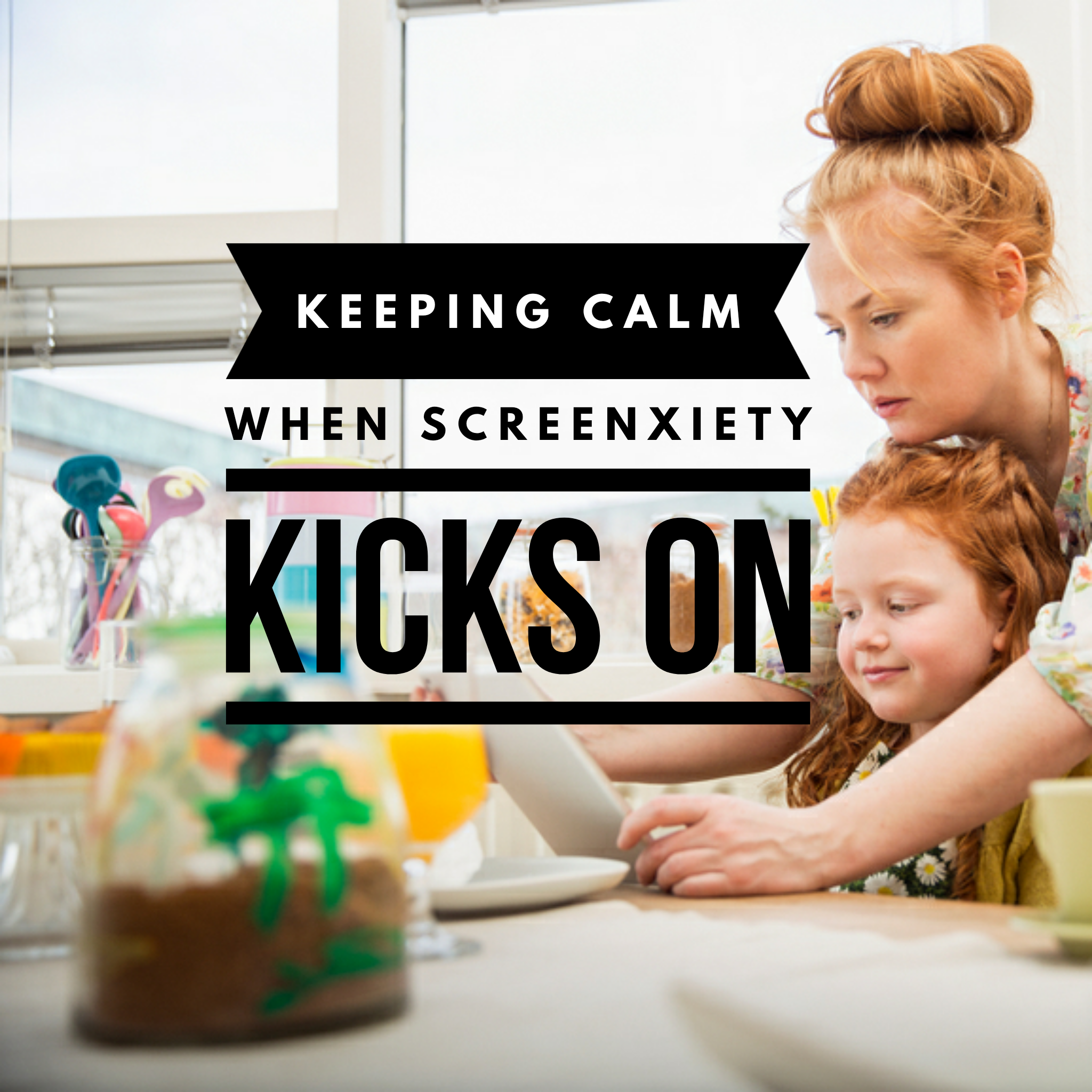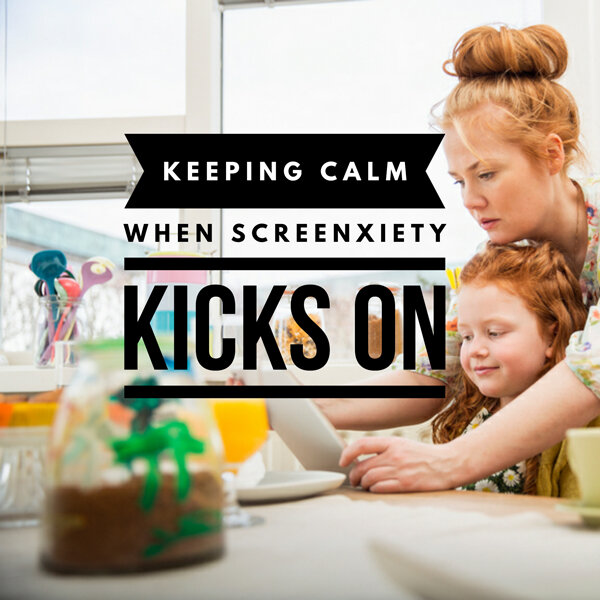


If all of the unanswered questions of this pandemic weren’t enough, today’s parents are navigating a stressful terrain of screentime management. Even before the world of Zoom calls, distance learning assignments, and social media “family challenges”…keeping tabs on our children’s screentime was enough to cause any calm parent to have a decent amount of anxiety. That’s why we were thrilled when our friend, Caroline Hexdall, Ph.D., licensed psychologist, let us pick her brain about ways we can calm the anxiety we feel over our kids’ screen habits.
Answer: When I was in high school, my parents invested in a brick. More precisely, it was a Motorola car phone. The reason was known – for safety, in case of an emergency. Since then, car phones became cell phones, which became smart phones and the staples of our lives. But while the size of these devices has gotten smaller, our anxiety on the whole, has gotten larger.
As parents, our devices have contributed to an increase in vigilance. As our children get older and are away from us more, it is natural for us to become more alert – more vigilant of their whereabouts and with whom they are spending time. And yet, sometimes it can become crippling. I hear stories of parents of college students who still track their geolocator and call to interrogate them about why they aren’t in their history class by 10:05am on Mondays. These parents believe geolocator tracking is helping them protect their kids, but it can be a response to being gripped by anxiety – “What would happen to my child if he doesn’t continue to perform academically? I can’t risk letting that happen!” The ability to have more information about their child’s whereabouts can actually increase anxiety (compared to our parents when we were In college who heard from us once a week) and can lead to a debilitating lack of independence and self-reliance for the children.
Answer: Anxiety shows itself in two ways. First, the physiological signs, sweating hands, racing heart, sick stomach, flushed face and an overall sense that something isn’t right. Second, psychological signs: worrying thoughts, racing thoughts that keep you up at night, or playing out worse case scenarios in your head.
Anxiety is triggered by the question, “what if…”. I see this with my clients regarding screentime all the time. “What if I don’t give my child a phone and they can’t get a hold of me in case of an emergency?” What if I don’t let my child have Instagram and they get bullied in school for being the only kid without it?” These “what ifs” are all rooted in the question, “Am I safe” or “is my child safe?” and can cause us to make knee jerk decisions. We have to take a moment to pause and think deeply about our decision, why we’re making them and if it’s based off of anxiety.
Answer: Within parenting, I like to think of values as what you treasure most. These can be things like, self-care, compassion, honesty, faith etc. When you model knowing your values to your kids, you teach them that they can have values too which can open the door to some really beautiful conversations regarding how we can support and protect each other’s values, what we treasure most.
Answer: Absolutely! Our kids are always observing us right? So when they see us put away our phones at the dinner table, or not take our phones to bed with us or put it on silent after 5pm, we’re modeling to our children that we treasure quality time and therefore, it’s not okay for me to have my phone out during dinner or take my phone to my room, or whatever your boundary may be.
Answer: The same decision could be made during a state of anxiety and a state of calm but one will feel very different. Decisions made during states of anxiety can be those we regret later on or those that are in the long run unhealthy for our children. Parents struggling with anxiety tend to tighten reins, which is actually harder for our kids. Finding appropriate ways to give them a voice and a choice (e.g., picking what to watch for family movie night) can help them build confidence and independence – and help them feel in control amidst a world that in many ways feels out-of-control.
This is where practicing mindfulness is a great asset. Take inventory of your surroundings, how are you feeling physically and psychologically? Do they mirror the anxiety signs I talked about earlier? Or, do you feel steady in your thoughts, grounded in your emotions and are you pulling from your values, what you treasure most. All anxiety wants to know is, “Am I safe right now?” If we can look where we are at that very moment and say, yes I am safe, then we can kindly tell anxiety, “Hey, I’m okay, you don’t have to drive right now.”
Answer: I had a client that was wrestling with the decision of when to give their child a phone. They really valued independence and wanted to model that for their child but didn’t feel right about them having a phone yet. When they took a moment to pause, they were able to think through some of their “what ifs.” They realized that without a phone, their child would have more opportunities to practice independence than they would with one. So they made the decision to hold off on giving them a phone for a little while. When you make a decision based on your values, you usually feel proud of yourself and I could tell this was what my client experienced.
A personal example happened last week. I was feeling overwhelmed by our new reality of life at home right now, as everyone is and I remembered I hadn’t had any alone time in a while and that I wasn’t honoring my value of self-care. I recognized one of my “what if” thoughts was, if I let them on their screens they’ll never get off and become addicted. So instead of letting that anxiety drive, I made a decision from my values and let my kids take some time to watch TV so that I could take some time by myself. This allowed all of us to de-stress and we came back an hour later, refreshed and ready to continue our day. What I chose to value here in the global pandemic, wasn’t feeding anxiety, it was feeding the value of self care.
Thanks, Caroline! The truth is—we’re in a new frontier. May we all learn to give ourselves a lot of grace as we parent our kids–especially when it comes to screens—and maybe even trying to laugh a little along the way. Comedian Jim Gaffigan shared this week, “Parents are always trying to get the screens away from their children. But during quarantine and distance learning, you give them the screens…and then you take them, and then you give them, and then you take them. It’s fun. It’s fun. If you don’t know what it’s like to take a screen from a child, just imagine you’re trying to convince an addict to go to rehab…” We’re in this together.